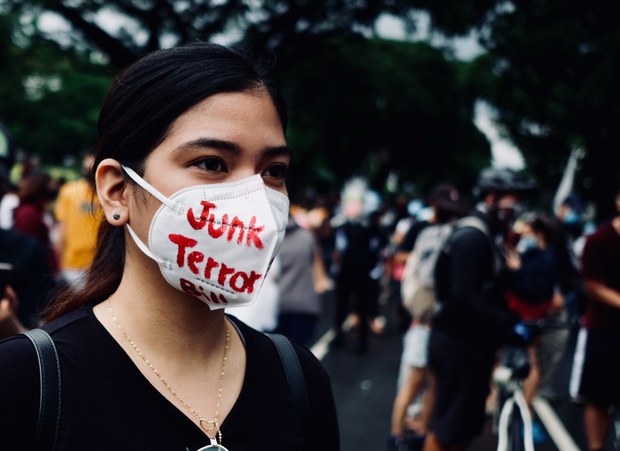Philippines: Duterte Signs Anti-terror Law
2020.07.03
Manila
 A protester joins a rally at the University of the Philippines calling for the government to scrap the anti-terror bill, June 12, 2020.
A protester joins a rally at the University of the Philippines calling for the government to scrap the anti-terror bill, June 12, 2020.
Philippines President Rodrigo Duterte on Friday signed the controversial Anti-Terrorism Act, which critics have denounced as likely to set the stage for abuses including torture and crackdowns on peaceful dissent.
Presidential spokesman Harry Roque justified the move, saying it was in line with the administration’s goal of ridding the country of terrorism.
"The signing of the aforesaid law demonstrates our serious commitment to stamp out terrorism, which has long plagued the country and has caused unimaginable grief and horror to many of our people,” Roque said in a statement.
The new law, which repeals the Human Security Act of 2007, allows the government to arrest suspected terrorists without warrant and detain them without charges for up to 24 days.
New York-based Human Rights Watch said these provisions would “permit warrantless arrests and weeks of incommunicado detention, which facilitates torture and mistreatment.”
Local and international human rights groups also predicted that the new law would be used to squelch free speech.
"The Anti-Terrorism Law will give a green light to the systematic targeting of political critics and opponents, as well as ordinary Filipinos who dare to speak out,” warned Phil Robertson, deputy Asia director of HRW.
"Foreign governments should publicly denounce this development, which amounts to a stealth declaration of martial law," he added.
Philippine-based rights group Karapatan said the new law would have far-reaching implications on expression of dissent and would affect the work of human rights defenders. It vowed to question the law in the Supreme Court.
"The fight is far from over. We will not let this fascist regime cower us into silence and fear. We cannot let them take away our hard-won rights and freedoms,” it said.
A ‘blurring of distinctions’
On Tuesday, U.N. High Commissioner for Human Rights Michelle Bachelet urged Duterte to refrain from signing the law.
“The recent passage of the new Anti-Terrorism Act heightens our concerns about the blurring of important distinctions between criticism, criminality and terrorism,” she said, adding that the law could have a chilling effect on human rights and humanitarian work, hindering support to vulnerable communities.
"I urge the President to refrain from signing the law, and to initiate a broad-based consultation process to draft legislation that can effectively prevent and counter violent extremism – but which contains safeguards to prevent its misuse against people engaged in peaceful criticism and advocacy,” she said.
The law was signed days after four alleged militants with links to the Islamic State perished in a raid by joint police and military personnel in the Manila suburb of Parañaque City. The militants were believed to be working with an IS branch led by Mundi Sawadjaan, a relative of IS-Philippine head Hatib Hajan Sawadjaan who is believed to be plotting further attacks.
Sawadjaan masterminded last year's bombing of a Catholic church in southern Jolo island that left 23 dead, including two Indonesian suicide bombers.
It also came three years after IS militants from Southeast Asia and the Middle East took over the city of Marawi in the south. Five months of heavy fighting followed, leaving an estimated 1,200 government forces, militants and civilians dead in what is the largest outbreak of violence in the country in recent years. The leader of the IS at the time, Isnilon Hapilon, a commander of the militant Abu Sayyaf group, was slain. He was replaced by Sawadjaan.
In early June, the Philippine military sought to allay public fears that government security forces could use changes to the country’s anti-terrorism law to crack down on dissent.
The changes were meant only to boost the Armed Forces of the Philippines (AFP) in its campaign against terrorism, military spokesman Brig. Gen. Edgard Arevalo said then.
“The new proposed legislation gives more teeth to the existing law and eliminates some provisions that tend to curtail rather than aid security forces to defeat terrorism,” Arevalo said.
“The bill passes through the crucible of intense deliberations to ensure that it will not trample upon people’s rights, but rather defend their rights to life, liberty and property as well as the freedom from fear which the AFP seeks to uphold,” he said.
The act’s provisions include a measure that would fine any government security unit 500,000 pesos (close to U.S. $10,000) for each day it keeps a terror suspect in custody, but who is later found not guilty of links to terrorism, he said. That should make authorities wary of carrying out arrests, Arevalo said.
While it may not end terrorism immediately, the proposed law would it easier for the government to penalize acts that contribute to deadly attacks, the military spokesman said.







